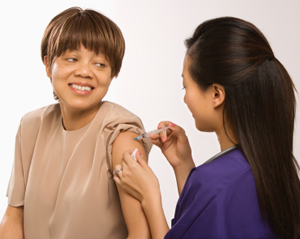Seasonal Flu Vaccine Now Available for Students
High-risk students can get seasonal flu vaccines from Student Health Services. It is anticipated that H1N1 vaccinations will begin in early November.

Vaccination is a powerful tool in preventing the spread of flu. Student Health Services is focusing its plans to immunize students. There are two different vaccines this year, one for seasonal flu and the other for H1N1. It is anticipated that H1N1 vaccinations will not begin until early November. The campus community will be notified as soon as H1N1 influenza vaccination can begin.
High-risk students can get seasonal flu vaccines from Student Health Services as vaccine supplies permit. It is anticipated that H1N1 vaccinations will begin in early November. Please call (619) 594-3078 for information on vaccine availability.
At this time, there are a limited number of doses of vaccine and the focus will be on high-risk students. Faculty and Staff are being asked to consult their personal health care provider for their vaccinations.
Student Health Services Immunization walk-in hours
Monday-Thursday
8:30 a.m. – 12 p.m.
1:30 p.m. – 4 p.m.
If you have any questions, call (619) 594-7339.
Vaccination priority
H1N1 and seasonal flu vaccinations will be administered according to risk priority. H1N1 vaccination is recommended for the higher priority groups, even if you have been diagnosed with or think you might have had H1N1 flu.
For more information about risk assesment, please see the Student Health Services flu information page.
Most people with the flu can take care of their illness without having to see a health-care provider:
- Individuals with flu symptoms should stay home for at least 24 hours after they no longer have a fever, or signs of a fever, without the use of fever-reducing medicines such as acetaminophen (Tylenol®), ibuprofen (Motrin®, Advil®), naproxen (Aleve®), or aspirin (if you're over age 18). People infected with seasonal and 2009 H1N1 flu may be able to infect others from one day before getting sick to seven days after becoming ill.
- Therefore, if you are a health-care student or worker, CDC recommends you stay home for at least a week or until your symptoms have resolved, whichever is longer.
- Drink clear fluids (such as water, broth, sports drinks, electrolyte beverages for infants) to keep from becoming dehydrated.
- Stay away from classes and limit interactions with other people, except to seek medical care; remain in your room as much as practical.
- If you live in campus housing, notify your residential advisor (RA) about your illness so that he or she can work on measures to reduce the spread of the infection to others.
- Get a “flu buddy”, pair up with another student to deliver your meals and make contact with professors if you're ill.
- Return home if your family lives relatively close to campus to keep roommates from getting infected.
- Wear a surgical mask if close contact with others cannot be avoided.
Consider seeing a health-care provider at Student Health Services or elsewhere for antiviral medication if you have flu symptoms and:
- You have a chronic medical condition such as asthma, diabetes, immune system suppression by HIV or other disorder or medical treatment
- You are pregnant
- Are under age 19 and taking long-term aspirin therapy
- You are 65 years or older
Emergency warning signs that need urgent medical attention include:
- Difficulty breathing or shortness of breath
- Pain or pressure in the chest or abdomen
- Sudden dizziness
- Confusion
- Severe or persistent vomiting
- Flu-like symptoms improve but then return with fever and worse cough
To reduce your risk of becoming ill or transmitting infections to others use common sense and follow measures that you’ve already heard about such as:
- Cover your mouth and nose with a tissue when you cough or sneeze,
- Wash your hands frequently with soap and water, especially after coughing or sneezing; use of alcohol-based hand cleaners is also effective.
- Avoid touching your eyes, nose, or mouth; germs are spread this way.
- Throw tissues and other disposable items used by a sick person in the trash. Wash your hands after touching used tissues and similar waste.
Urgent Campus Information website
Last spring a website was created to provide timely information regarding H1N1 at San Diego State, as well as general information about the virus and other resources. The Urgent Campus Information website will be updated as it becomes necessary.
Faculty is also being encouraged to utilize the Blackboard learning management system so that, in the event of class cancellations, they have the ability to more easily communicate with students to support course work. Faculty can learn more about Blackboard through Instructional Technology Services.
Campus Contacts
Students with health-related questions can contact Student Health Services’s Flu Information Line at (619) 594-3078 or the office at (619) 594-5281.
Tips for coping with stress and anxiety as a result of the flu outbreak are available from Counseling & Psychological Services.
Other questions can be sent via e-mail to [email protected].



